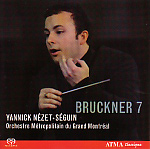Yannick Nézet-Séguin evidently has great admiration for Bruckner’s Symphony No. 7, but admiration alone, no matter how sincere, does not readily translate into a convincing performance. The conductor’s tempos are on the moderate-to-slow side, though this is not necessarily a concern as there have been a few great slowly-paced Sevenths. Nézet-Séguin’s problem is that he equates “relaxed” with “lifeless”, and it’s that all-important spark of vitality that this performance lacks, something readily apparent in the blurred rhythms and dulled accents that consistently mar the reading.
You could argue that the large, very resonant acoustic is a probable cause of this impression, but then Jochum’s 1970s Dresden Staatskapelle recording reveals plenty of bite despite its very live acoustic. Jochum’s reading also is infinitely more involving, burning with an interpretive fire and mastery that clearly elude Nézet-Séguin, whose bland climaxes (the first movement’s “sunrise” coda is dimmed by murky brass chording and restrained dynamics; the cymbal crash at the adagio’s great climax is barely audible) and tensionless phrasing (the “seafaring” scherzo sounds stuck in dry-dock; the finale’s brass interjections are flat-footed) add up to a pretty unsatisfying rendition.
The Grand Montreal Metropolitan Orchestra is an ensemble of accomplished musicians, but it has not yet developed a true Brucknerian sound, the kind we hear regularly from the Vienna Philharmonic (most recently with Harnoncourt), the Concertgebouw Orchestra, and the Chicago Symphony; the rather opaque recording does little to demonstrate the advanced technology of SACD. Definitely not a top choice.
































